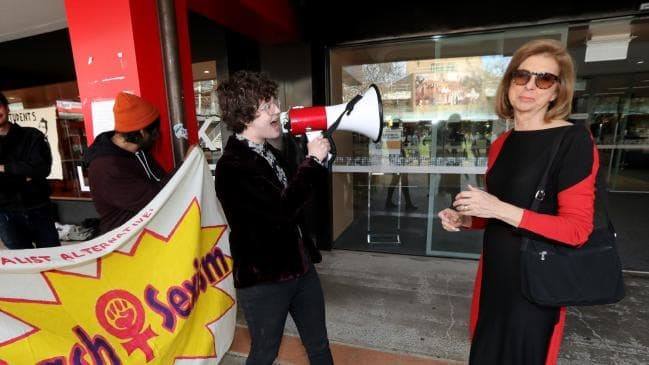CW: Assault
Controversial social commentator and author of the book “#mentoo” Bettina Arndt has been confirmed to speak at the University of Western Australia on March 7 on her ‘My Fake Rape Crisis Campus’ speaking tour.
In a Facebook post announcing the speaking engagement, Arndt writes that “It’s frightening how students across Australia have been intimidated by the feminists with many groups now too nervous to host my events…”.
Later in the same post she also states that, “The goal of this event is not to talk to a small group on campus about this issue but to alert ordinary student to what is happening in their universities – the fact that activists are using the campus rape scare campaign to bully universities into getting involved in adjudicating rape cases. This is really dangerous for young men and damaging to our university system”.
Arndt has previously conducted speeches at La Trobe University, Sydney University and Macquarie University. The event is not currently listed on the public UWA Events page, and at the bottom of the event ticketing page, it is stated that “this event is presented by Bettina Arndt and views expressed at the event do not necessarily reflect the views of The University of Western Australia.”
Arndt’s tour comes a year after the The Red Zone Report, an investigation by the advocacy group End Rape on Campus, into sexual violence and hazing in Australian university residential colleges.
In a separate 2017 report by the Australian Human Rights Commission, titled Change the Course. The Report found that of the 30,000 students from 39 Australian universities surveyed, half said that they were sexually harassed on at least one occasion in 2016 alone, with one in three incidents of harassment taking place on University grounds. The Report disclosed that women were twice as likely to be harassed and three times as likely to be sexually assaulted, compared to men. In a previous Pelican article, it was stated that “The survey which formed the basis of the report’s findings was administered to over 30,000 students across 39 Australian universities. The report revealed that women at university were twice as likely to be harassed, and three times as likely to be sexually assaulted, as men. A further 36% of those surveyed witnessed sexual harassment at UWA in 2016, a figure substantially higher than the 25% mean across the other universities surveyed. In 70% of cases, the perpetrator of most recent sexual harassment was a fellow student from UWA. In 78% of cases, the perpetrator was male.”
In an additional investigation conducted by Channel 7’s Sunday Night regarding rape and sexual misconduct at Australian universities, UWA refused to comply with the Freedom of Information Act in the handing over of information related to the program.
The University has several consultation sessions held in order to formulate policy on freedom of expression, previously discussed by Pelican. The Working Group will be holding further consultation sessions next week, with Arndt scheduled to speak in the week following – assuming that she does not receive the same sort of response from the university community as did Quentin Van Meter.
Following the outrage-induced cancellation of Van Meter, an anti-LGBT American endocrinologist who described the treatment of gender dysphoria as “child abuse”, UWA’s Vice Chancellor, Dawn Freshwater, has maintained her belief that opinions and views, whether objectionable or not, should not be censored in consideration of public sentiment. Freshwater expressed a desire for UWA to follow in the footsteps of the University of Chicago, whose ‘Chicago Statement’ explains that, “Faculty, students and staff are free to criticise, contest and condemn views [but] may not interfere with the freedom of others to express views they reject or even loathe.”
After much uproar from students and staff, UWA’s academic union backed the students, stressing the difference between intellectual freedom and hate speech, “intellectual freedom does not extend to speech that can harm people – hate speech. It is absolutely inappropriate for a public university, of all places, to promote a platform for these views.”
Freshwater, however, criticised the “silencing” and “oppression” methods of activist groups in opposition to Van Meter’s event, “The paradox is that they’re doing that to get a message across about how offensive other people are, it’s important for us not to succumb to threats of violence and the sort of fear that’s instilled by not tolerating difference.”
In early 2018 Freshwater wrote an email to students informing them of a newspaper article detailing instances of historic sexual assault and harassment cases at the University. In the email, Freshwater wrote that “there is no place for sexual assault or harassment at UWA. The university will continue to take a no-tolerance approach to this behaviour.”
In a statement provided to Pelican, Women’s Officer for the UWA Guild Bre Shanahan said that, “Accepting Arndt’s booking request undermines the progress the university has committed to since the release of the Change the Course report in 2017. It undermines UWA’s commitment to the Respect. Now. Always. Campaign. It leaves a sour taste as we head into celebrating the Women’s Departments Women’s Day Brunch on March 7, and International Women’s Day itself on March 8. Universities are a place of academic rigour and intellectual standard; Arndt falls beneath this in every way”.
On the ticketing page for the event, it states that the intention of the speaking engagement aims to “challenge(s) the myth of the ‘rape crisis’ on university campuses. (Arndt) argues the current campus rape scare campaign is pushing universities into adjudicating rape cases without normal legal protections for the accused…[and] her campus tour aims to alert the public to the dangers of this orchestrated campaign by feminist activists – the risks it poses to young men at our universities and to the standing of our higher education sector.”
More to come.
Words by Elanor Leman, Eliza Huston and Sophie Minissale

